Abstract
In the 1970s, the identification of the histamine H2-receptor by Black and the subsequent development of histamine H2-receptor antagonists revolutionized our understanding and treatment of acid/peptic disorders. More recently, the identification of hydrogen-potassium-stimulated adenosine triphosphatase (H+/K(+)-ATPase) as the proton pump of the parietal cell and the recognition of the prominent role of Helicobacter pylori in the pathogenesis of duodenal and gastric ulceration have heralded a new revolution in our understanding and treatment of these disorders. Substituted benzimidazole compounds (omeprazole, lansoprazole and pantoprazole) that covalently bind to and inactivate the proton pump allow complete and prolonged inhibition of acid secretion. Not only can peptic ulcers now be healed more rapidly with proton pump inhibitors, but refractory ulcers have all but disappeared. Eradication of H. pylori with antibiotics offers, for the first time, a permanent cure for most duodenal and many gastric ulcers.
Full text
PDF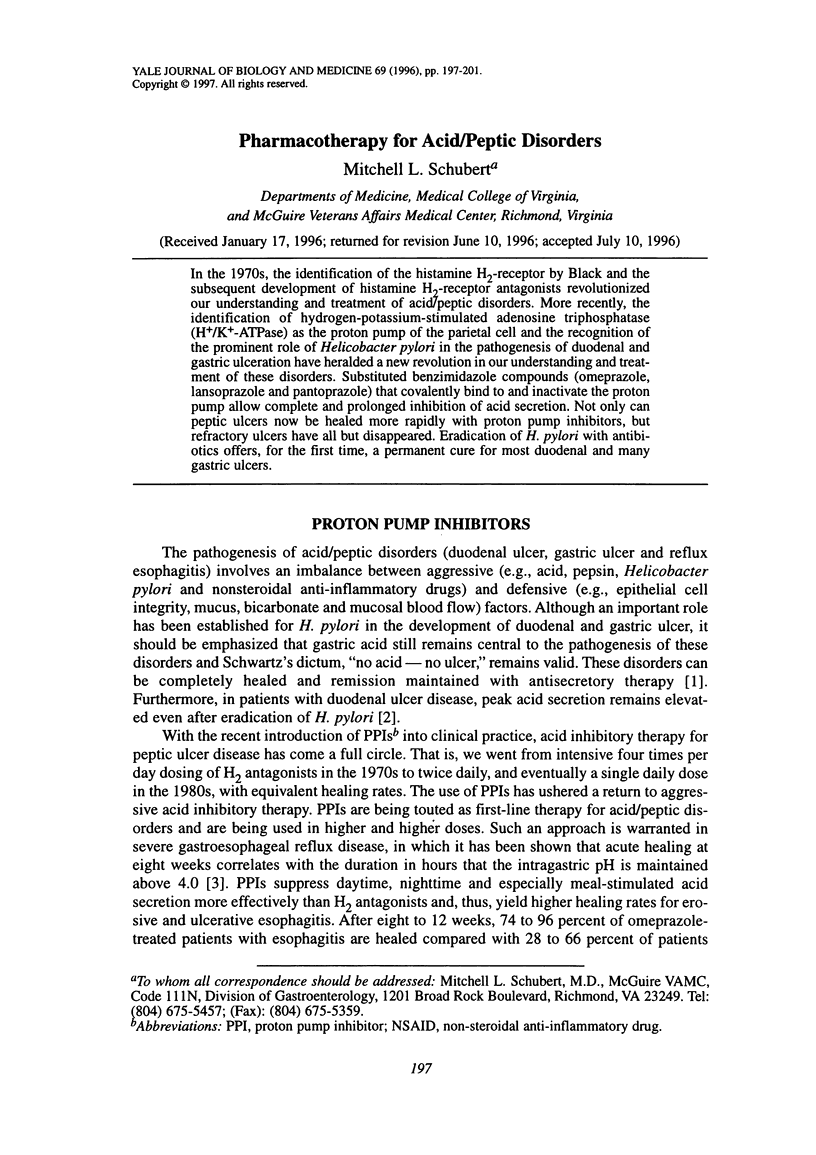
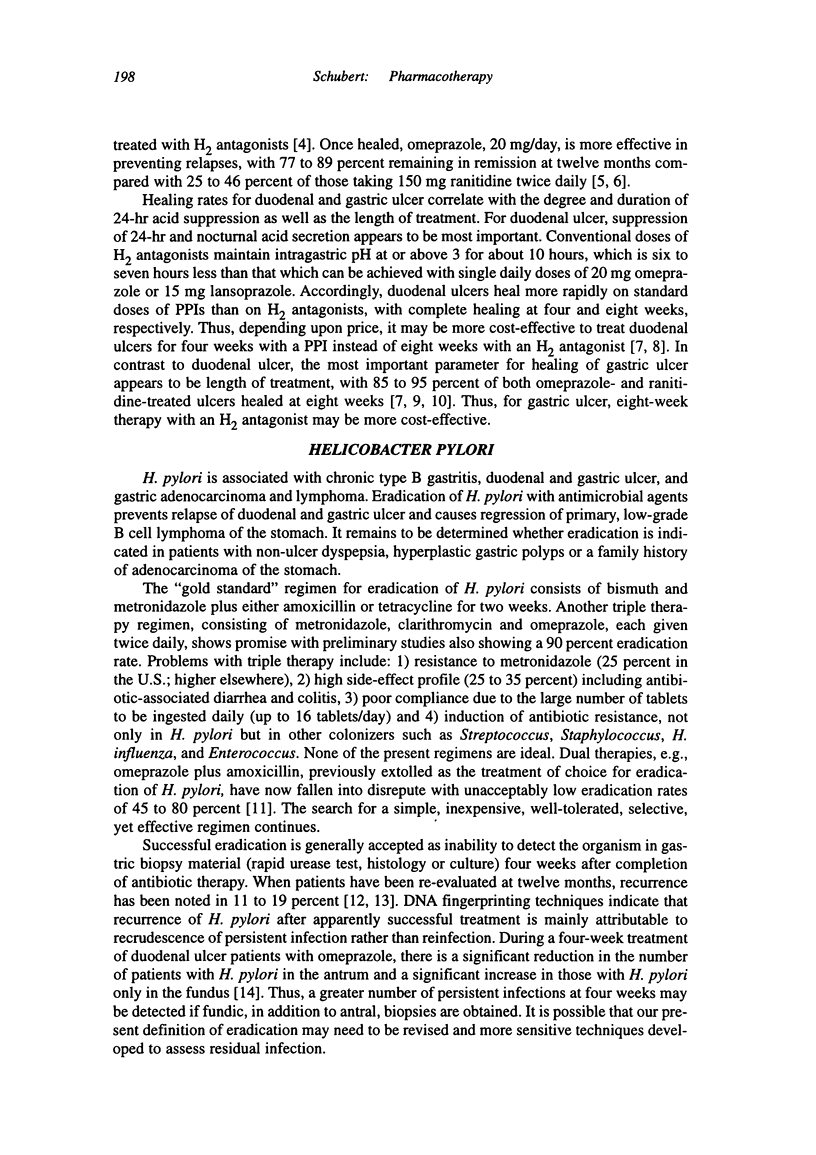
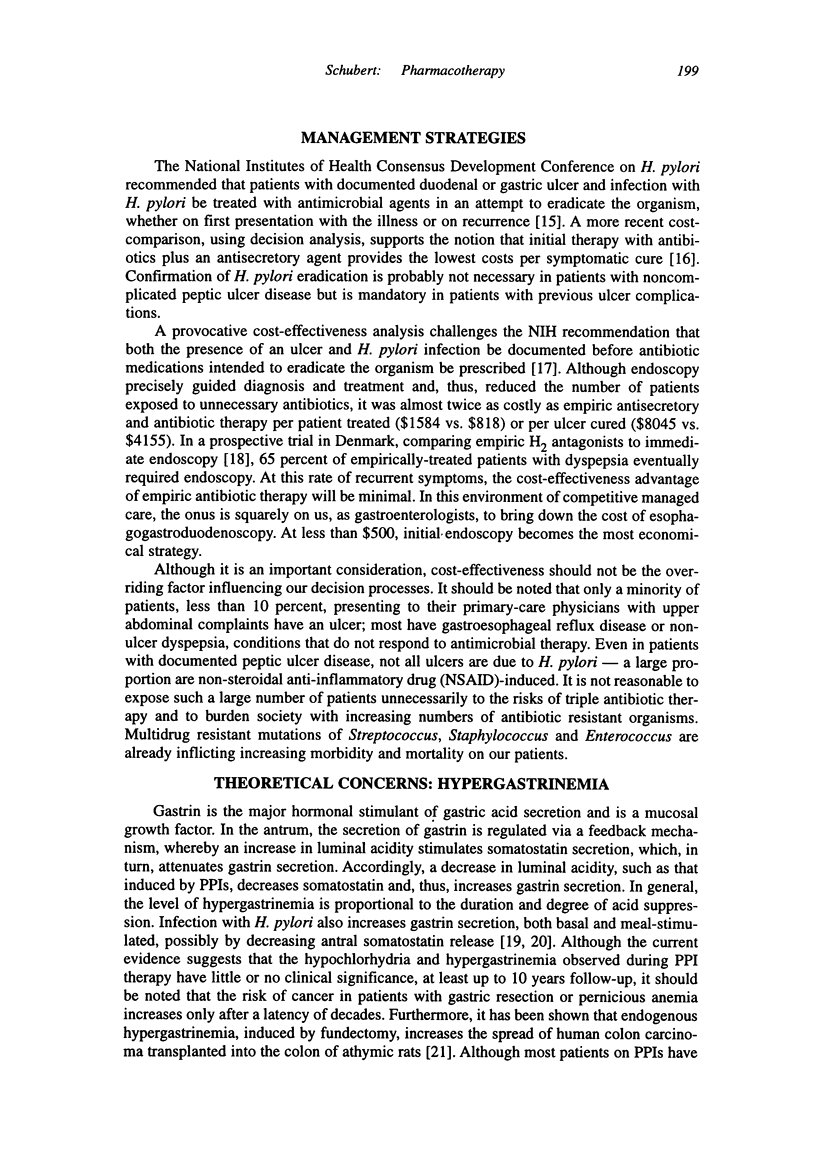
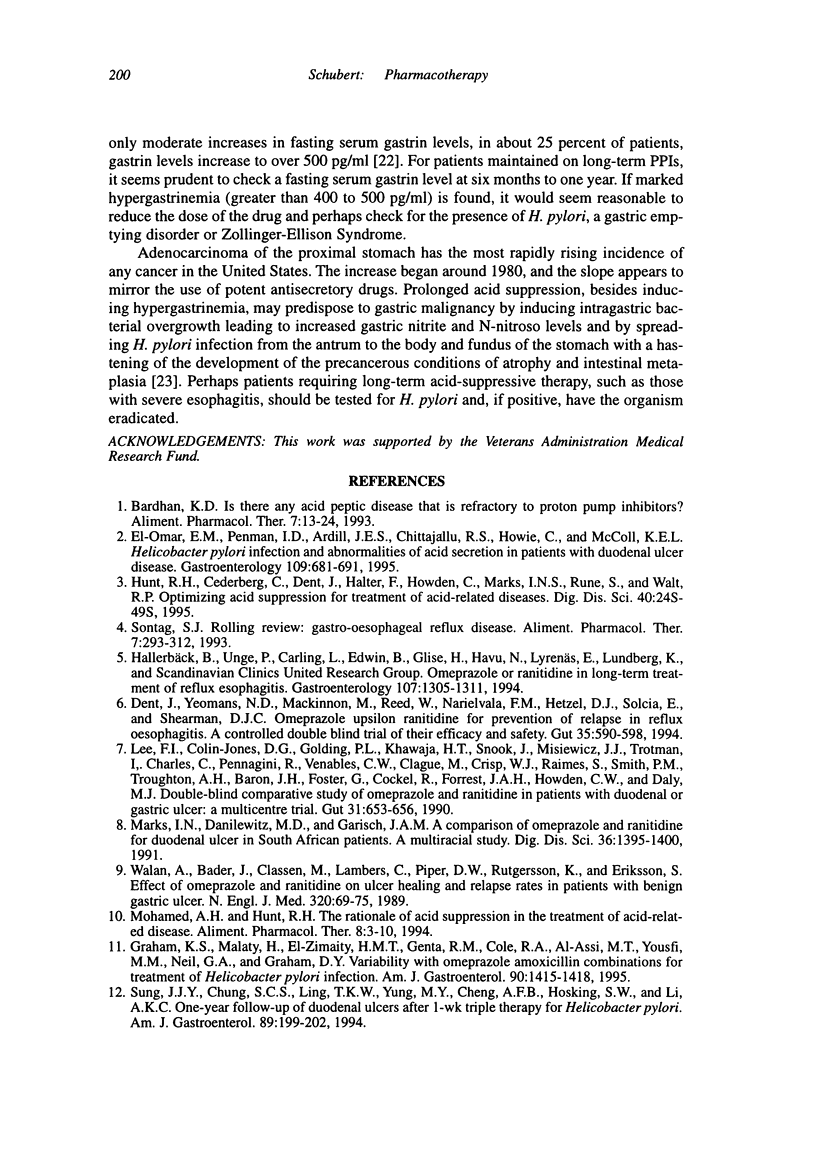
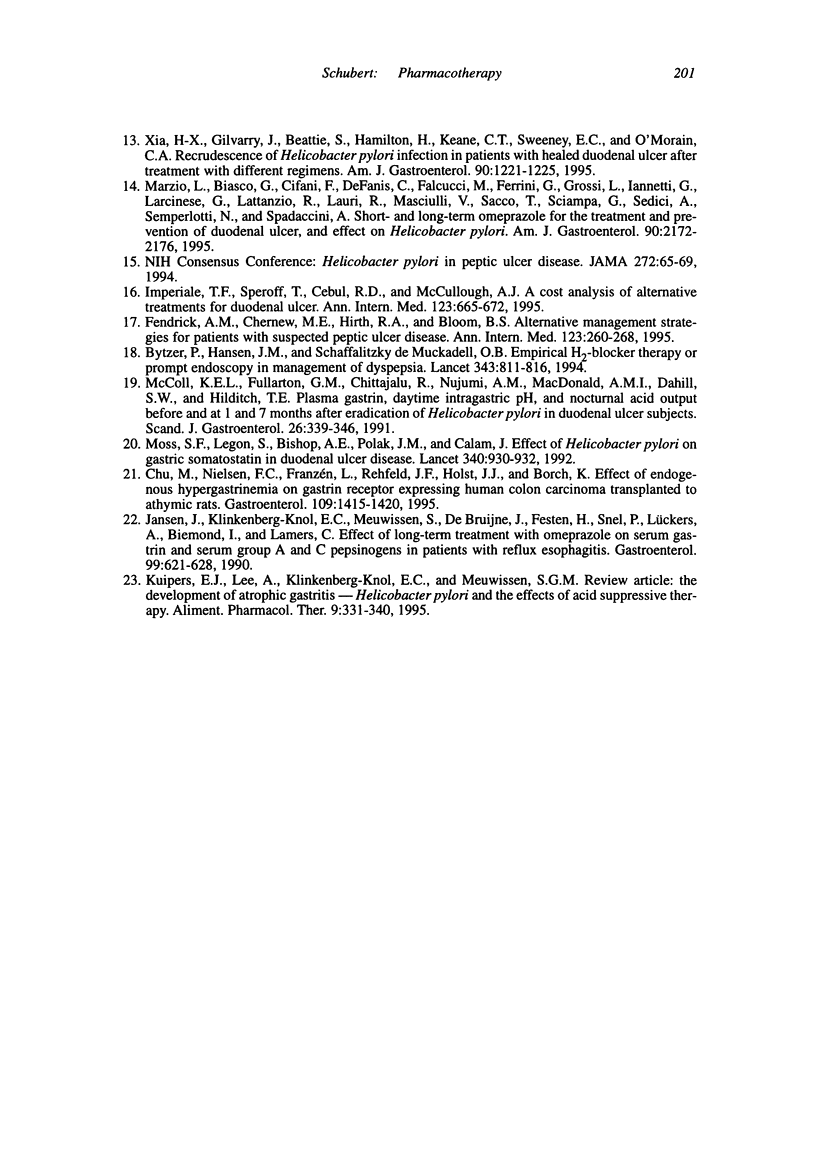
Selected References
These references are in PubMed. This may not be the complete list of references from this article.
- Bardhan K. D. Is there any acid peptic disease that is refractory to proton pump inhibitors? Aliment Pharmacol Ther. 1993;7 (Suppl 1):13-24, discussion 29-31. doi: 10.1111/j.1365-2036.1993.tb00583.x. [DOI] [PubMed] [Google Scholar]
- Bytzer P., Hansen J. M., Schaffalitzky de Muckadell O. B. Empirical H2-blocker therapy or prompt endoscopy in management of dyspepsia. Lancet. 1994 Apr 2;343(8901):811–816. doi: 10.1016/s0140-6736(94)92023-0. [DOI] [PubMed] [Google Scholar]
- Chu M., Nielsen F. C., Franzén L., Rehfeld J. F., Holst J. J., Borch K. Effect of endogenous hypergastrinemia on gastrin receptor expressing human colon carcinoma transplanted to athymic rats. Gastroenterology. 1995 Nov;109(5):1415–1420. doi: 10.1016/0016-5085(95)90625-8. [DOI] [PubMed] [Google Scholar]
- Dent J., Yeomans N. D., Mackinnon M., Reed W., Narielvala F. M., Hetzel D. J., Solcia E., Shearman D. J. Omeprazole v ranitidine for prevention of relapse in reflux oesophagitis. A controlled double blind trial of their efficacy and safety. Gut. 1994 May;35(5):590–598. doi: 10.1136/gut.35.5.590. [DOI] [PMC free article] [PubMed] [Google Scholar]
- Fendrick A. M., Chernew M. E., Hirth R. A., Bloom B. S. Alternative management strategies for patients with suspected peptic ulcer disease. Ann Intern Med. 1995 Aug 15;123(4):260–268. doi: 10.7326/0003-4819-123-4-199508150-00003. [DOI] [PubMed] [Google Scholar]
- Graham K. S., Malaty H., el-Zimaity H. M., Genta R. M., Cole R. A., al-Assi M. T., Yousfi M. M., Neil G. A., Graham D. Y. Variability with omeprazole-amoxicillin combinations for treatment of Helicobacter pylori infection. Am J Gastroenterol. 1995 Sep;90(9):1415–1418. [PubMed] [Google Scholar]
- Hallerbäck B., Unge P., Carling L., Edwin B., Glise H., Havu N., Lyrenäs E., Lundberg K. Omeprazole or ranitidine in long-term treatment of reflux esophagitis. The Scandinavian Clinics for United Research Group. Gastroenterology. 1994 Nov;107(5):1305–1311. doi: 10.1016/0016-5085(94)90531-2. [DOI] [PubMed] [Google Scholar]
- Hunt R. H., Cederberg C., Dent J., Halter F., Howden C., Marks I. N., Rune S., Walt R. P. Optimizing acid suppression for treatment of acid-related diseases. Dig Dis Sci. 1995 Feb;40(2 Suppl):24S–49S. doi: 10.1007/BF02214870. [DOI] [PubMed] [Google Scholar]
- Imperiale T. F., Speroff T., Cebul R. D., McCullough A. J. A cost analysis of alternative treatments for duodenal ulcer. Ann Intern Med. 1995 Nov 1;123(9):665–672. doi: 10.7326/0003-4819-123-9-199511010-00004. [DOI] [PubMed] [Google Scholar]
- Jansen J. B., Klinkenberg-Knol E. C., Meuwissen S. G., De Bruijne J. W., Festen H. P., Snel P., Lückers A. E., Biemond I., Lamers C. B. Effect of long-term treatment with omeprazole on serum gastrin and serum group A and C pepsinogens in patients with reflux esophagitis. Gastroenterology. 1990 Sep;99(3):621–628. doi: 10.1016/0016-5085(90)90946-x. [DOI] [PubMed] [Google Scholar]
- Kuipers E. J., Lee A., Klinkenberg-Knol E. C., Meuwissen S. G. Review article: the development of atrophic gastritis--Helicobacter pylori and the effects of acid suppressive therapy. Aliment Pharmacol Ther. 1995 Aug;9(4):331–340. doi: 10.1111/j.1365-2036.1995.tb00391.x. [DOI] [PubMed] [Google Scholar]
- Marks I. N., Danilewitz M. D., Garisch J. A. A comparison of omeprazole and ranitidine for duodenal ulcer in South African patients. A multiracial study. Dig Dis Sci. 1991 Oct;36(10):1395–1400. doi: 10.1007/BF01296805. [DOI] [PubMed] [Google Scholar]
- Marzio L., Biasco G., Cifani F., DeFanis C., Falcucci M., Ferrini G., Grossi L., Iannetti G., Larcinese G., Lattanzio R. Short- and long-term omeprazole for the treatment and prevention of duodenal ulcer, and effect on Helicobacter pylori. Am J Gastroenterol. 1995 Dec;90(12):2172–2176. [PubMed] [Google Scholar]
- McColl K. E., Fullarton G. M., Chittajalu R., el Nujumi A. M., MacDonald A. M., Dahill S. W., Hilditch T. E. Plasma gastrin, daytime intragastric pH, and nocturnal acid output before and at 1 and 7 months after eradication of Helicobacter pylori in duodenal ulcer subjects. Scand J Gastroenterol. 1991 Mar;26(3):339–346. doi: 10.3109/00365529109025052. [DOI] [PubMed] [Google Scholar]
- Mohamed A. H., Hunt R. H. The rationale of acid suppression in the treatment of acid-related disease. Aliment Pharmacol Ther. 1994;8 (Suppl 1):3–10. doi: 10.1111/j.1365-2036.1994.tb00203.x. [DOI] [PubMed] [Google Scholar]
- Moss S. F., Legon S., Bishop A. E., Polak J. M., Calam J. Effect of Helicobacter pylori on gastric somatostatin in duodenal ulcer disease. Lancet. 1992 Oct 17;340(8825):930–932. doi: 10.1016/0140-6736(92)92816-x. [DOI] [PubMed] [Google Scholar]
- NIH Consensus Conference. Helicobacter pylori in peptic ulcer disease. NIH Consensus Development Panel on Helicobacter pylori in Peptic Ulcer Disease. JAMA. 1994 Jul 6;272(1):65–69. [PubMed] [Google Scholar]
- Sontag S. J. Rolling review: gastro-oesophageal reflux disease. Aliment Pharmacol Ther. 1993 Jun;7(3):293–312. doi: 10.1111/j.1365-2036.1993.tb00101.x. [DOI] [PubMed] [Google Scholar]
- Sung J. J., Chung S. C., Ling T. K., Yung M. Y., Cheng A. F., Hosking S. W., Li A. K. One-year follow-up of duodenal ulcers after 1-wk triple therapy for Helicobacter pylori. Am J Gastroenterol. 1994 Feb;89(2):199–202. [PubMed] [Google Scholar]
- Walan A., Bader J. P., Classen M., Lamers C. B., Piper D. W., Rutgersson K., Eriksson S. Effect of omeprazole and ranitidine on ulcer healing and relapse rates in patients with benign gastric ulcer. N Engl J Med. 1989 Jan 12;320(2):69–75. doi: 10.1056/NEJM198901123200201. [DOI] [PubMed] [Google Scholar]
- Xia H. X., Gilvarry J., Beattie S., Hamilton H., Keane C. T., Sweeney E. C., O'Morain C. A. Recrudescence of Helicobacter pylori infection in patients with healed duodenal ulcer after treatment with different regimens. Am J Gastroenterol. 1995 Aug;90(8):1221–1225. [PubMed] [Google Scholar]
- el-Omar E. M., Penman I. D., Ardill J. E., Chittajallu R. S., Howie C., McColl K. E. Helicobacter pylori infection and abnormalities of acid secretion in patients with duodenal ulcer disease. Gastroenterology. 1995 Sep;109(3):681–691. doi: 10.1016/0016-5085(95)90374-7. [DOI] [PubMed] [Google Scholar]


